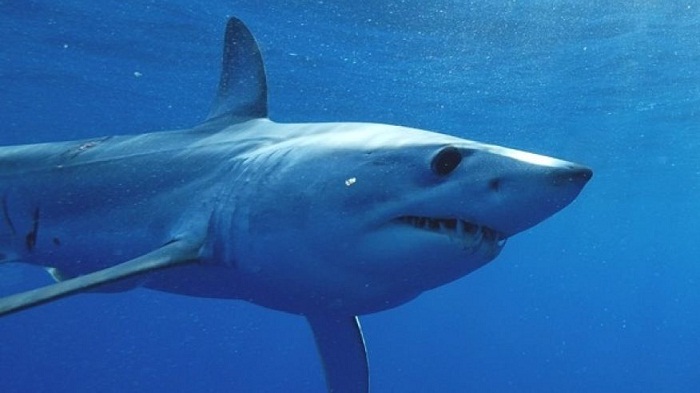"We’ve had some of our tagged makos take some pretty interesting tracks over the years, but this one swims above the rest,” Mahmood Shivji, a professor at Florida’s Nova Southeastern University and the Director of the school’s Guy Harvey Research Institute (GHRI), said in a statement. “Having Hell’s Bay report for as long as he has is fantastic because we’re able to really get a detailed look at mako migration behavior over a good amount of time."
"He was like the Energizer bunny – he kept going and going and going, and luckily did not get captured like many of our other sharks," he added.
Hell’s Bay was first tagged in May 2015 off of the coast of Ocean City, Md. In the first half of his journey, he travelled north along the eastern seaboard, and then made a return near the original tagging site. According to the GHRI’s data, Hell’s Bay spent 2016 hanging around the Maryland area with occasional jaunts throughout the Atlantic, exploring the northern beauty of Nova Scotia and taking in beach days near Bermuda before heading back to Ocean City. So far this Year, the mako has been following a similar pattern, but closer to the coastline.
“These satellite tags allow us to follow sharks in near-real time,” said Greg Jacoski, executive director of the Guy Harvey Ocean Foundation. “Understanding where these animals travel and the habitat that they use is the first step to better conserving the species.”
The researchers add that the movements of Hell’s Bay show clear seasonal patterns in which he spent the winter and early spring offshore and the other season on or close to the continental shelf.
The shark’s tag is still active and his movements can be tracked on a public website set up by the GHRI.
Hell’s Bay, who is named after a Florida boat works company that sponsored his tagging, is part of a larger study by GHRI where it was reported that 22 percent of the makos that have been satellite tagged were found to have been caught or killed by commercial or recreational fisherman.
“That highlights what mako sharks face on a daily basis in their natural habitat,” Shivji said in a statement. “It’s something we have to work around, but every time we lose a shark we lose another opportunity to learn about these magnificent animals.”
Shivji als points out that sharks are being killed off in high numbers worldwide. Some estimates say that between 70-100 million sharks are killed every year—numbers that are not sustainable removal levels. Many shark species, including makos, have a low reproductive rate.
/Fox News/
More about:
















































